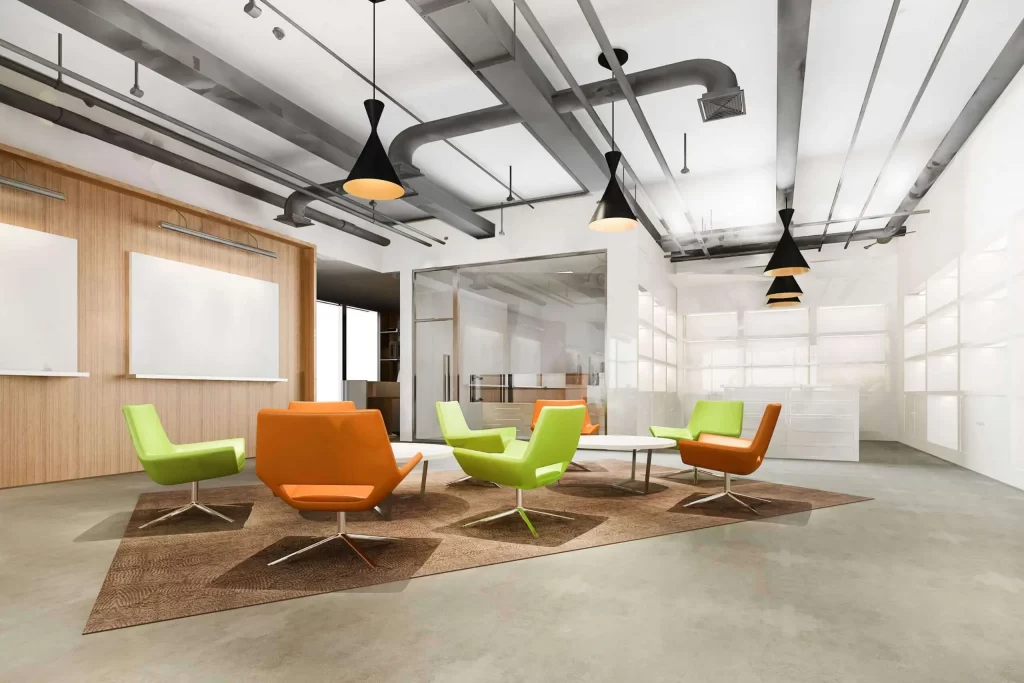Picture this: you’re starting a new business, and you’ve reached the point where working from your kitchen table or local coffee shop just won’t cut it anymore. It’s time to take the next step and find an office space that will not only provide a professional environment for your team but also help your business grow.
Renting an office space can bring legitimacy to your brand, increase productivity, and create a sense of community among your team. But where do you start? In this comprehensive guide, we’ll walk you through the process of rental business through space rental script and estimating the space you need to cultivate your company culture.
Table of Contents
- Do You Really Need an Office Space?
- Estimate the Space You Need
- Ask About Included Amenities
- Compare Different Office Types
- Explore the Neighboring Area
- Avoid Legal Pitfalls
- Consider Your Budget
- Look for Flexible Terms
- Personalize Your Space
- Observe Your Business’s Growth
- Learn about Building Security and Maintenance Features
- Cultivate Your Company Culture
- Be Respectful of Others Using the Space
1. Do You Really Need Office Space?
Before diving into the process of renting an office space, it’s important to evaluate whether your business truly needs one. Consider how office space will impact your workflow and team collaboration. Here are some benefits to help you make an informed decision:
- Mail Delivery: Having a reputable business address separate from your home or P.O. Box adds professionalism and privacy.
- Search Engine Optimization: A physical address allows you to verify your business on Google Maps and local search results, boosting your online presence.
As Koriko Creative shared, “Investing in our businesses and renting a private office space has fostered good conversations and collaborations.” Renting an office space can enhance your brand image and create opportunities for growth.
2. Estimate the Space You Need
One of the first steps in renting an office space is determining the amount of space your business requires. Consider your team size, growth projection, and work environment preferences. Answer these questions to estimate the space you need:
- How many people are on your team?
- How many square feet of space will each person require?
- Do you anticipate any growth in your team during the lease period?
Sheri Williams, Head of Customer Success at Solv Health, emphasizes the importance of finding a space that accommodates growth: “Expansive’s variety of spaces allowed us to stay in the same location as we grew our team.”
3. Ask About Included Amenities
When considering different office spaces, it’s crucial to assess the amenities they offer. A fully functional and well-equipped workspace can make a significant difference. Look for amenities like:
- Fiber internet for fast and reliable connectivity
- Fully furnished workspaces to save you time and effort
- On-site management for immediate assistance
- Printers, scanners, and copiers for convenient document handling
- On-demand conference rooms for professional meetings
- Mail service to streamline your business communications
- Free access to espresso, coffee, tea, and filtered water for a productive work environment
Ensure that the amenities provided align with your business needs and enhance your team’s productivity.
4. Compare Different Office Types
Choosing the right office type is crucial to creating a conducive work environment. Consider the following options:
- Coworking Spaces: Ideal for startups and entrepreneurs seeking a collaborative and flexible environment. Co-working spaces offer shared workspaces and common areas, fostering networking opportunities.
- Office Suites: Suitable for growing teams that require dedicated, customizable spaces. Office suites often include dedicated kitchens and private entrances, allowing businesses to create a unique brand presence.
- Private Offices: Provide privacy and focus for individuals or small teams. Private offices offer room for growth, making them suitable for new teams, freelancers, or businesses expanding into new locations.
- Dedicated Desks: Similar to co-working memberships, dedicated desks offer affordability and flexibility. They provide a reserved desk within a shared private office, along with the security of a locking file cabinet.
- Virtual Offices: Ideal for remote workers who need a professional business address and occasional access to meeting rooms. Virtual offices offer a business presence without the need for a physical workspace.
Consider the unique needs of your business and the preferences of your team when selecting the right office type.
5. Explore the Neighboring Area
Location plays a vital role in your office space selection. Consider factors such as accessibility, transportation options, and nearby amenities. Some key points to consider:
- Public Transportation: Is there easy access to public transportation for your team and clients?
- Bike-Friendly Facilities: Does the office space provide bike racks or facilities for team members who prefer cycling?
- Nearby Amenities: Are there coffee shops, restaurants, or other conveniences in close proximity? A vibrant neighborhood can enhance your team’s work-life balance and provide networking opportunities.
Expansive, for example, offers prime urban locations at affordable rates. Their San Jose building is close to major tech companies, while their Chicago location is steps away from popular dining and entertainment options.
6. Avoid Legal Pitfalls
When renting a commercial office space, it’s essential to carefully review the terms of your lease agreement. Pay attention to details such as lease length, start date, and renewal options. Additionally, consider the following:
- Insurance and Taxes: Clarify whether insurance, property taxes, and maintenance costs are included in the rent or if they are additional expenses.
- Security Deposit: Understand the security deposit terms and the conditions for its return.
- Common Areas: Determine which common areas are included in your rent and how they contribute to your overall office experience.
Taking the time to understand your lease agreement and associated costs will help you avoid any legal complications.
7. Consider Your Budget
Establishing a budget is crucial when renting an office space. It’s important to strike a balance between affordability and the amenities and features you require. Consider the following factors when budgeting:
- Rent: Determine how much you can allocate towards monthly rent while keeping your business financially stable.
- Amenities and Additional Costs: Account for amenities, maintenance, taxes, mail service, furniture, and other factors that may add to your overall budget.
By considering all financial aspects, you can ensure that your office space rental aligns with your budgetary constraints.
8. Look for Flexible Terms
As you review lease agreements, keep an eye out for any flexibility offered by the office space provider. Some options to consider include:
- Discounts for Long-Term Agreements: Providers may offer rent discounts for signing a longer-term agreement, such as a one or two-year contract.
- Flexibility in Office Space Usage: Some providers offer flexible usage options, allowing you to reserve a private office for specific days or times.
- Expansion Opportunities: Inquire about the potential to expand your office space as your business grows.
Negotiating and securing flexible terms can support the long-term viability and growth of your business.
9. Personalize Your Space
Your office space should reflect your brand identity and create a positive work environment. Consider ways to personalize your space:
- Design Elements: Incorporate posters, photographs, and artwork that inspire and motivate your team.
- Inspirational Quotes: Display quotes that resonate with your company’s values and goals.
- Comfortable Furniture: Bring in furniture from home or choose ergonomic options to create a cozy and functional workspace.
Customizing your office space can enhance productivity and boost team morale.
10. Observe Your Business's Growth
While a single office may meet your current needs, it’s essential to consider future growth and scalability. Keep the following points in mind:
- Team Growth: Determine how many new team members you expect to add in the coming months or quarters.
- Future Expansion: Consider whether your business is likely to grow further in the next year.
By planning ahead, you can ensure that your office space accommodates your team’s future needs.
11. Learn about Building Security and Maintenance Features
Safety and security should be top priorities for your office space. When evaluating potential locations, inquire about the following:
- Security Measures: Find out about keycard access, security cameras, and emergency protocols.
- Maintenance Response: Ask how the building handles technical or mechanical issues to minimize disruptions to your work.
A secure and well-maintained space will provide peace of mind for you and your team.
12. Cultivate Your Company Culture
Building a strong company culture is vital for team cohesion and success. Consider the following steps to cultivate your company culture within your office space:
- Define Your Values: Engage your team in discussions to identify the values that are most important to them.
- Personalize the Space: Incorporate elements that reflect your company’s values and create a positive work environment.
- Encourage Collaboration: Design spaces that foster collaboration and teamwork, such as communal areas or breakout rooms.
- Promote Work-Life Balance: Consider amenities that support work-life balance, such as wellness rooms or recreational areas.
By nurturing your company culture, you create an environment that attracts and retains top talent.
13. Be Respectful of Others Using the Space
Sharing your office floor with other businesses and professionals requires mutual respect. Foster a harmonious work environment by following these guidelines:
- Maintain Noise Levels: Be mindful of your volume during meetings or conversations in shared spaces.
- Respect Privacy: Avoid interrupting others when they are focused on their work.
- Build Relationships: Engage in friendly interactions and networking opportunities with neighboring businesses.
Developing positive relationships with those around you can lead to valuable partnerships and collaborations.
To Sum Up
Now that you have a comprehensive guide to renting your first office space, it’s time to take the next step. Evaluate your business needs, consider your budget, and explore different office types to find the perfect space for your team. Remember to personalize your office and create a positive work environment that reflects your company culture. With careful planning and consideration, you’ll find an office space that supports your growth and success.








